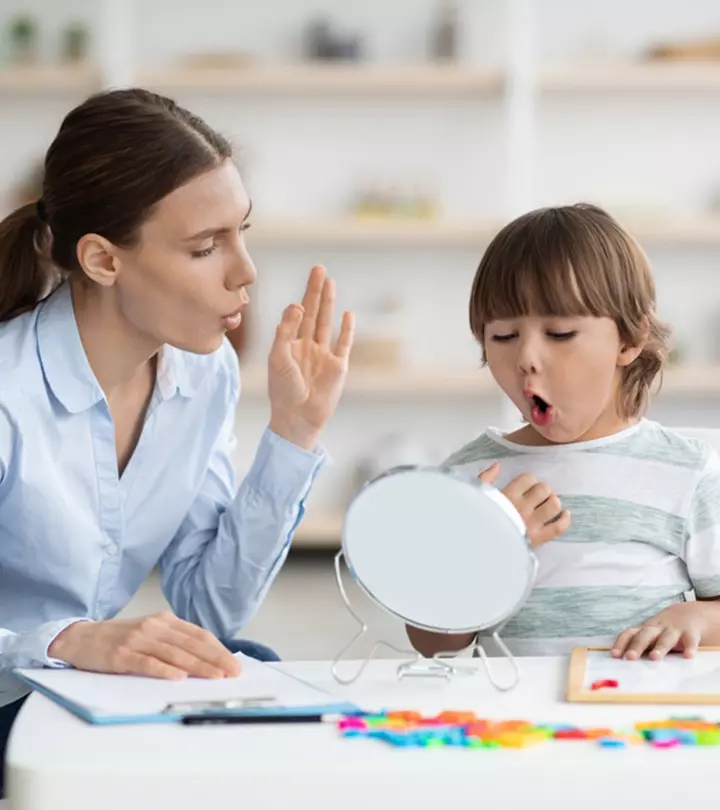
Image: Shutterstock
Speech therapy is vital for children’s communication skills. It improves language and communication abilities in individuals facing difficulties. In this article, we’ll cover how it works, what it treats, signs of your kids needing therapy, and more. We’ll also discuss the benefits of early intervention speech therapy and how it caters to toddlers and elementary-aged kids. Additionally, we’ll explore the options of private speech therapy and when it is best to start therapy.
How Does Speech Therapy Work?
Image: Shutterstock
Speech therapy involves tailored techniques and exercises provided by highly trained speech-language pathologists (SLPs). They assess, diagnose, and develop personalized treatment plans for children’s speech and language challenges.
During speech therapy sessions, therapists use a variety of techniques to target specific goals. These may include articulation exercises to improve speech clarity, language activities to enhance vocabulary and grammar skills, and fluency techniques for individuals who stutter. They also incorporate various tools such as visual aids, sign language, and assistive communication devices to support the learning process.
What Does Speech Therapy Treat?
Image: Shutterstock
Speech therapy can address a wide range of communication difficulties in children. It is beneficial for children who have the following speech difficulties:
1. Articulation Disorders
These involve difficulties with producing speech sounds correctly. Children may substitute, omit, or distort sounds, which can impact their ability to be understood.
2. Language Disorders
These encompass difficulties in understanding and using language effectively. Children may struggle with vocabulary, grammar, comprehension, or expressing their thoughts coherently.
3. Stuttering
Stuttering is a speech fluency disorder characterized by disruptions in the flow of speech. It can include repetitions of sounds or words, prolonged sounds, or blocks where the speech becomes momentarily stuck.
4. Voice Disorders
These involve problems with pitch, volume, or quality of the voice. Children with voice disorders may sound hoarse, breathy, or have an abnormal vocal quality.
5. Pragmatic Language Disorders
Pragmatic language refers to the social use of language. Children with pragmatic language disorders may have difficulties with turn-taking, maintaining eye contact, understanding nonverbal cues, or appropriately using language in social situations.
Signs A Child May Need Speech Therapy
Image: Shutterstock
Recognizing the signs that your child may benefit from speech therapy is essential for early intervention. Some common indicators include:
1. Limited Vocabulary
If your child has a significantly smaller vocabulary compared to their peers, or struggles to find the right words to express themselves.
2. Difficulty Understanding
If your child has trouble understanding instructions, following conversations, or comprehending age-appropriate books.
3. Speech Intelligibility Issues
If your child’s speech is consistently unclear and difficult for others to understand, even after the expected age of intelligibility.
4. Late Or Inconsistent Milestones
If your child is not reaching speech and language milestones within the expected time frame or exhibits significant inconsistencies in their progress.
5. Frustration Or Avoidance
If your child becomes frustrated, avoids communication situations, or shows signs of social withdrawal due to speech and language difficulties.
What Is Early Intervention Speech Therapy?
Image: Shutterstock
Early intervention is crucial in speech therapy, as it allows professionals to address communication challenges at the earliest stages of development. Early intervention speech therapy focuses on children from birth to three years old, targeting language acquisition, early communication skills, and parent-child interaction. It aims to optimize a child’s communication abilities during the critical early years when brain development is most rapid.
Speech Therapy For Toddlers
Toddlers often benefit from speech therapy interventions that emphasize play-based learning. Therapists may use age-appropriate toys, games, and activities to engage children and promote speech and language development. These sessions focus on building vocabulary, improving imitation skills, enhancing social communication, and facilitating early literacy skills.
Speech Therapy For Elementary-Aged Kids
Elementary speech therapy focuses on structured goals, enhancing language skills, articulation, academic communication, and social development for confident and effective communication. Therapists employ targeted interventions to support children in their language and communication journey, fostering growth and unlocking their potential. Through a nurturing environment, elementary speech therapy cultivates essential skills for successful interactions both in and out of the classroom.
What Age Is Best To Start Speech Therapy?
Image: Shutterstock
The ideal age to begin speech therapy depends on individual needs. It’s best to consult a speech-language pathologist for guidance on the appropriate timing for your child’s speech and language development. Their expertise ensures that your child receives tailored support to maximize their communication potential. Early intervention plays a crucial role in addressing speech and language difficulties, fostering confident and effective communication skills.
How Effective Is Speech Therapy?
Speech therapy is highly effective in improving communication skills for children with speech and language difficulties. Success depends on commitment, practice, parental involvement, and the expertise of the speech-language pathologist. Early intervention and regular therapy lead to significant progress in speech and language abilities.
Speech therapy is a valuable resource for parents concerned about their child’s speech and language development. It enhances expression, social engagement, and academic success. Recognizing signs, seeking professional guidance, and active participation in therapy support the child’s unique communication journey. With the right support, each child can reach their full potential in speech and language skills.

















